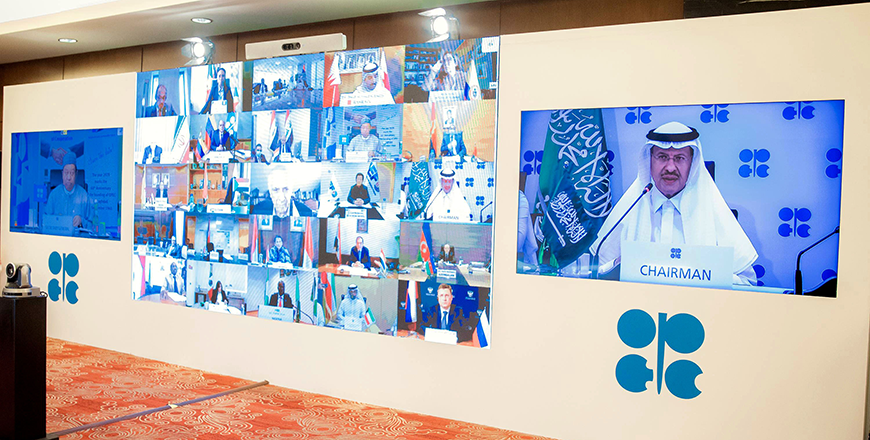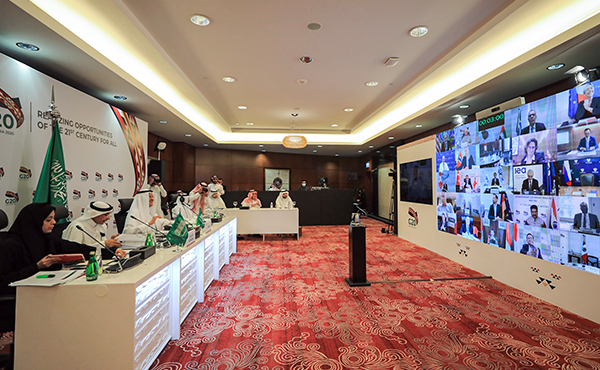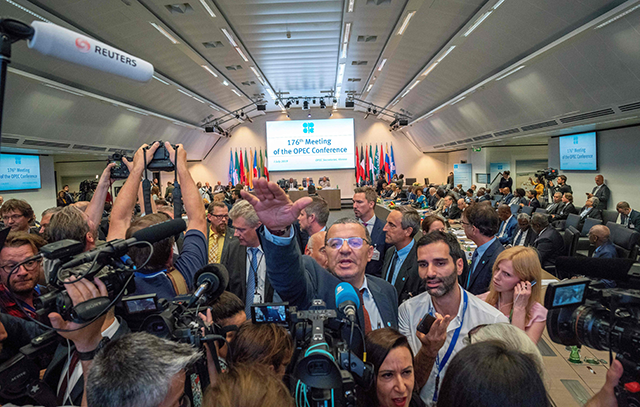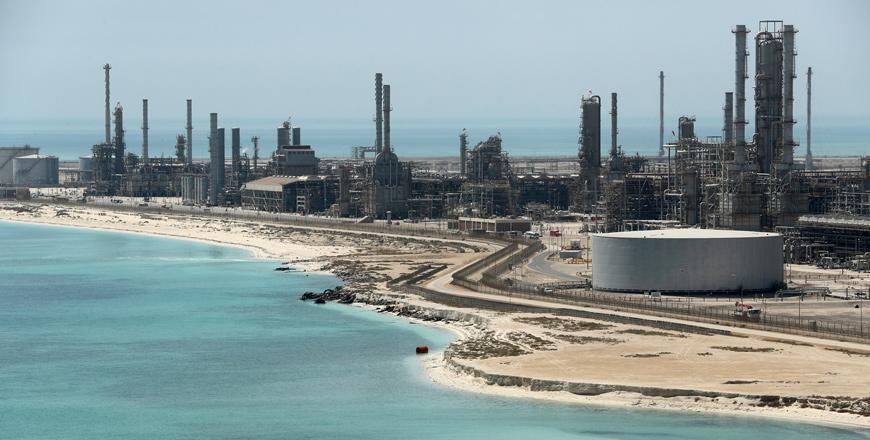You are here
G-20 energy ministers scramble to finalise oil output deal
By AFP - Apr 11,2020 - Last updated at Apr 11,2020

Saudi Energy Minister Prince Abdulaziz Bin Salman Al Saud (right), chairing the virtual extraordinary meeting of the Organisation of the Petroleum Exporting Countries (OPEC) and non-OPEC countries on April 9, 2020 ( AFP photo)
RIYADH — G-20 energy ministers held virtual talks on Friday as major oil producers scrambled to finalise output cuts to shore up prices, with Mexico announcing a deal with the United States that could end an impasse.
Mexico was the lone holdout in an OPEC-led agreement reached after marathon overnight talks that would see output slashed by 10 million barrels per day in May and June.
The standoff had cast doubt on efforts to bolster oil prices, pushed to near two-decade lows by the demand-sapping coronavirus pandemic and a Saudi-Russia price war.
The G-20 talks, hosted by top exporter Saudi Arabia, are expected to seal the deal more widely with non-OPEC countries in the group including Mexico, the United States and Canada.
Under the OPEC deal, Mexico was expected to cut production by 400,000 barrels per day but the country resisted during the overnight talks and demanded the reduction be limited to 100,000.
Speaking to reporters later Friday, Mexico's President Andres Manuel Lopez Obrador said he had reached an agreement with his US counterpart Donald Trump to cut production by 100,000 bpd.
He added that Trump had agreed to cut US production by 250,000 bpd "as compensation" for Mexico.
There was no immediate comment from Trump, and it was unclear whether the OPEC oil cartel and its allies would agree to the Mexico-US deal.
The production cut agreement hinges on Mexico's consent for it to take effect, the Organisation of the Petroleum Exporting Countries said early Friday after an hours-long meeting.
Riyadh, which currently holds the G-20's rotating presidency, has said the G-20 talks were aimed at ensuring "market stability".
Russian Energy Minister Alexander Novak urged the G-20 ministers to act in a spirit of "partnership and solidarity", according to a local television station.
"I hope that (the meeting) will help restore some much-needed stability to oil markets," said Fatih Birol, the head of the International Energy Agency.
"The extreme volatility we are seeing in oil markets is detrimental to the global economy at a time when we can least afford it."
'Storm clouds'
The deal marked a possible end of the price war between Russia and Saudi Arabia, which Bloomberg News said had agreed to slash output to around 8.5 million bpd.
The impact of the cuts on prices was not immediately clear as the global oil markets were shut on Friday for the Easter weekend.
But Stephen Innes, an analyst at AxiCorp, said the supply cuts were "less than the market hoped for" given the hit to demand from coronavirus lockdowns throughout the world.
"The deal currently tabled will only partially offset oil price distress, but that's what it was supposed to do. Still, the storm clouds for oil prices will only completely dissipate when lockdowns are lifted," he said.
Rystad Energy also said the cuts were not enough to restore market equilibrium.
"The proposed 10 million bpd cut by OPEC+ for May and June will keep the world from physically testing the limits of storage capacity and save prices from falling into a deep abyss, but it will still not restore the desired market balance," the energy research firm said.
'Hemorrhaging' industry
Oil prices have slumped since the beginning of the year due to the COVID-19 pandemic.
"Our industry is hemorrhaging; no-one has been able to stem the bleeding," OPEC Secretary General Mohammad Barkindo said ahead of the OPEC-led meeting, bemoaning companies already filing for bankruptcy and the tens of thousands of jobs that have been lost.
Compounding the problem, Riyadh and Moscow had both ramped up output in a bid to hold on to market share and undercut US shale producers.
While the US is not in the OPEC or OPEC+ groups, it is supportive of a reduction in supply in order to stabilise prices and breathe new life into its shale industry.
Trump had expressed optimism about the prospects for an agreement -- even as the talks appeared to be at an impasse.
Fresh from a conference call with Russian President Vladimir Putin and Saudi leader Crown Prince Mohammed bin Salman, Trump told a press briefing at the White House Thursday that a deal was "close".
Shale has transformed the US into the world's top producer, but the industry cannot sustain its high cost base as prices collapse.
Yet, the US oil sector appears reluctant to trim production, having extracted a near-record 13 mbpd in the final week of March. This fell to 12.4 mbpd last week.
At the same time, the global supply glut -- already weighing on oil markets before the coronavirus crisis -- has stretched oil storage capacity to its limits, forcing many producers to scale back output.
Related Articles
VIENNA — The world's top oil-producing countries were scheduled to meet via videoconference at 16:00 GMT on Sunday, a source close to OPEC s
LONDON — Top oil producers were scheduled to discuss on Thursday a possible cut in output after a collapse in demand due to the coronavirus
DUBAI — Saudi Arabia plans to cut its crude oil exports in April to below 7 million barrels per day (bpd), while keeping its output well bel

















